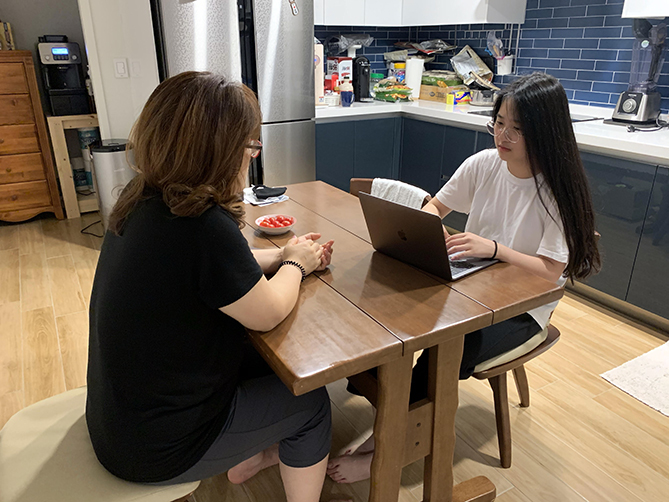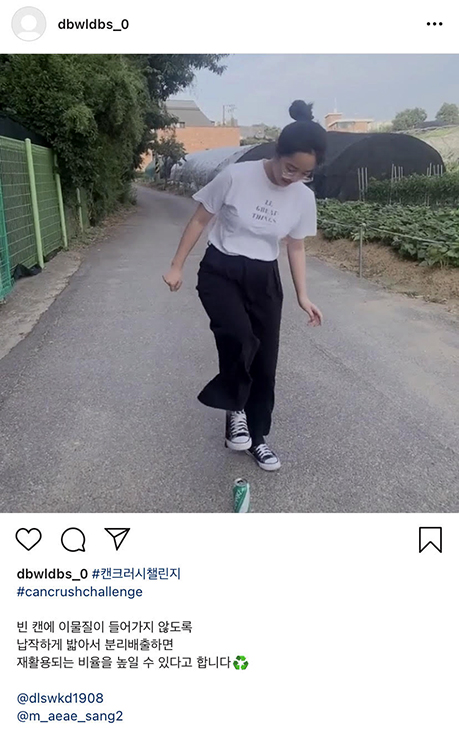Ever since the outbreak of COVID-19 and advent of social distancing, Koreans, as most people throughout the world, have been resorting to online shopping and delivery services. The consequence has been an increase in the amount of waste and recyclable materials, especially boxes and plastics. Foreigners may think that this is no problem for Korea, as it has consistently demonstrated preeminence in dealing with trash, even implementing a nationwide Volume-Based Waste Fee (VBWF) system (called jong-nyang-jae) since 1995. But even so, are people actually disposing their waste properly? There are strict regulations on recycling that people must adhere to in Korea, but it seems that many are lacking in awareness.
Joo seung Lee, a male teenager, said that he only knew the basics of recycling. “I know I should put plastics with plastic and paper with paper.” Hee-Eun Lim, a woman in her early 30s, said she only recently learned that the labels on plastic bottles and boxes were to be disposed of separately. “I have no idea how to throw away plastic bags or vinyl, though. I’m just throwing them away as general waste, but I’m not sure if that’s the right way to do it.” Hae Yeon Kwon, a homemaker in her 40s, said she was about 80 percent certain about recycling rules. “Besides all the generally ‘easy’ rules, I know that egg shells or chicken bones should not be sorted as food waste, and old clothes should not be sorted as regular trash,” Kwon said. “A lot of people don’t know that bones and shells should be thrown away as general trash. They think it’s food waste,” she added.

Overall, people seemed to have a general awareness of recycling. Many, however, did not know about its requirements and guidelines. This may prove to be a problem for Korea, as numerous trash collecting companies have announced that they would not collect any more waste from certain apartments if residents do not dispose of trash properly. Trash collectors took this drastic measure due to the extra labor that goes in when people do not sort their trash according to regulations. On top of this, with exports halted due to COVID-19, trash collectors are facing a major deficit from being unable to sell plastic waste. In fact, there was a 46 percent dip in average revenue from recycling this June compared to the months of January through March. Therefore, it seems all the more important for residents to do their best in adhering to the recycling regulations.
The problem with the status quo, no matter how conscientious Koreans may be compared to the rest of the world, is that people lack environmental awareness. Typically, Koreans’ primary education on recycling is given in elementary school, where kids learn the importance of recycling through textbooks and hands-on experience. Children learn the fundamentals of disposing plastic with plastic, paper with paper, and cans with cans. However, because such education is offered only during the primary years, people tend to forget the exact methods of recycling as they grow into adults. Knowledge about recycling may even become obsolete or outdated due to new disposal regulations. “Of course I don’t remember the recycling rules I learned during school. I only know how to recycle because of the environmental posters and recycling guidelines that our apartment provides,” said Lim. “I think it would be nice if people not just knew how to recycle but why they should. I, personally, would feel more responsible if I knew where and how these wastes end up.”
Fortunately, not all hope is lost for Korea’s future of recycling and environmental awareness. Companies such as OB Beer have led the 2020 Can Crush Challenge, which is an environmental campaign that promoted the proper way to recycle cans as well as raise funds to support the trash collecting companies that are suffering. It started with an Instagram video of the CEO of OB Beer recycling a can upon crushing it with his foot. This Instagram campaign continued as a relay, in which people who are tagged must do the same and tag the next set of people to participate. It was hugely successful: Can Crush Challenge was able to raise approximately $30,000 in funds. Similarly, Binggrae, a famous dairy company in Korea known best for its banana-flavored milk, also spearheaded a plastic recycling awareness project called Boonbastic Campaign in April, promoting the correct way to recycle different types of plastic as well as support NGOs through crowdfunding. This campaign also reaped success, as it collected approximately $31,000 to fund the NGO, and has resulted in Binggrae planning a subsequent environmental campaign.

Currently, Korea seems to be divided into two distinct categories: those that are environmentally aware and those that are not. With the added threat of waste piling up due to COVID-19, our world may be expecting its inhabitants to take at least minimum action to help combat the chaos. Who knows? A little more caution and effort on our part may go a long way in helping our world.

Jiyoon Yoo
Freshman (Grade 9)
Shepherd International Education

